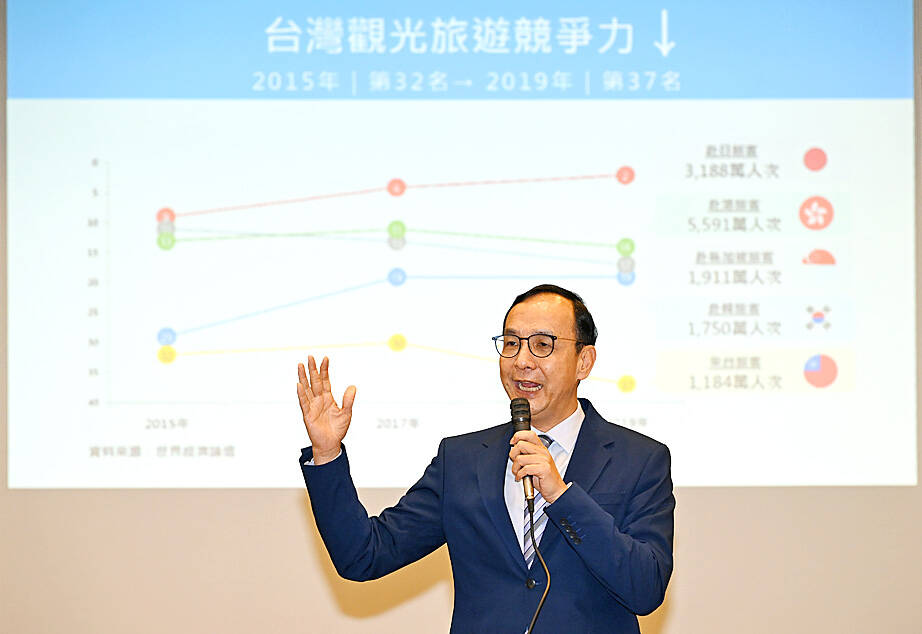The government should work with travel agencies on “smarter” tourism and seek to turn a crisis into gain, Chinese Nationalist Party (KMT) Chairman Eric Chu (朱立倫) said yesterday.
Chu accused President Tsai Ing-wen’s (蔡英文) administration of failing to implement efficient tourism policies, which he said would lead to Taiwan failing to develop a trillion-dollar tourism industry and generating NT$30 billion (US$986.7 million) in income from tourism per year.
Chu said that Taiwanese in 2019 spent NT$20.5 billion on overseas travel, more than that year’s combined income of firms engaged in domestic tourism of NT$14.4 billion.

Photo: Chang Chia-ming, Taipei Times
Chu said that under the previous KMT administration, foreign tourism grew 15 to 16 percent per year, but growth since 2017 has slowed to 2 to 3 percent.
The nation’s competitiveness in attracting tourists has dropped from 32nd in the world to 37th, while the nation’s regional competitors — Japan, Singapore, South Korea and Thailand — have seen rapid growth, he said.
This is a serious issue for the Tsai administration, Chu said.
Taiwan has not effectively marketed its Chinese cultural background, its indigenous cultures or local cuisine, while foreign media described the nation as a “pedestrian hell,” Chu said.
Programs implemented by the Tsai administration to stimulate domestic travel do not meet the needs of Taiwanese, he said, adding that domestic travelers on average spend 1.47 days at their destination, while international travelers spend 6.76 days.
‘TWENTY CHINESE CITIES’
Chu urged the Tsai administration to work to increase the number of cities in China that offer direct flights to Taiwan to 20 from four to make it easier for Chinese to travel to Taiwan.
Beijing has said it is willing to work with Taiwan on facilitating travel, Chu said.
The Tsai administration should not be blinded by ideology and should welcome tourists from all nations, including China, he added.
The Tsai administration’s goal to entice 6 million foreign and 1 million Chinese tourists to travel to Taiwan this year is an empty slogan as long as it does not work to increase the number of flight connections, Chu said.

Alain Robert, known as the "French Spider-Man," praised Alex Honnold as exceptionally well-prepared after the US climber completed a free solo ascent of Taipei 101 yesterday. Robert said Honnold's ascent of the 508m-tall skyscraper in just more than one-and-a-half hours without using safety ropes or equipment was a remarkable achievement. "This is my life," he said in an interview conducted in French, adding that he liked the feeling of being "on the edge of danger." The 63-year-old Frenchman climbed Taipei 101 using ropes in December 2004, taking about four hours to reach the top. On a one-to-10 scale of difficulty, Robert said Taipei 101

Nipah virus infection is to be officially listed as a category 5 notifiable infectious disease in Taiwan in March, while clinical treatment guidelines are being formulated, the Centers for Disease Control (CDC) said yesterday. With Nipah infections being reported in other countries and considering its relatively high fatality rate, the centers on Jan. 16 announced that it would be listed as a notifiable infectious disease to bolster the nation’s systematic early warning system and increase public awareness, the CDC said. Bangladesh reported four fatal cases last year in separate districts, with three linked to raw date palm sap consumption, CDC Epidemic Intelligence

US climber Alex Honnold left Taiwan this morning a day after completing a free-solo ascent of Taipei 101, a feat that drew cheers from onlookers and gained widespread international attention. Honnold yesterday scaled the 101-story skyscraper without a rope or safety harness. The climb — the highest urban free-solo ascent ever attempted — took just more than 90 minutes and was streamed live on Netflix. It was covered by major international news outlets including CNN, the New York Times, the Guardian and the Wall Street Journal. As Honnold prepared to leave Taiwan today, he attracted a crowd when he and his wife, Sanni,

Taiwanese and US defense groups are collaborating to introduce deployable, semi-autonomous manufacturing systems for drones and components in a boost to the nation’s supply chain resilience. Taiwan’s G-Tech Optroelectronics Corp subsidiary GTOC and the US’ Aerkomm Inc on Friday announced an agreement with fellow US-based Firestorm Lab to adopt the latter’s xCell, a technology featuring 3D printers fitted in 6.1m container units. The systems enable aerial platforms and parts to be produced in high volumes from dispersed nodes capable of rapid redeployment, to minimize the risk of enemy strikes and to meet field requirements, they said. Firestorm chief technology officer Ian Muceus said